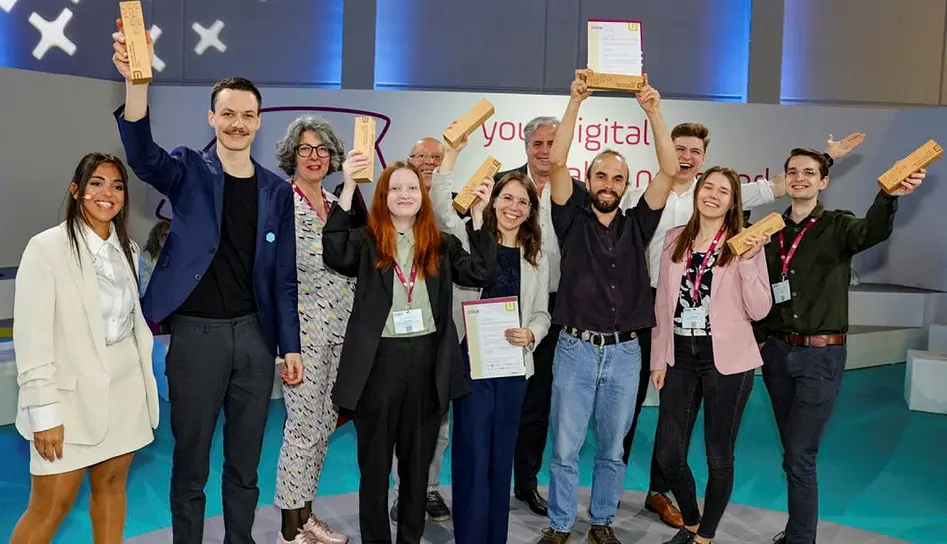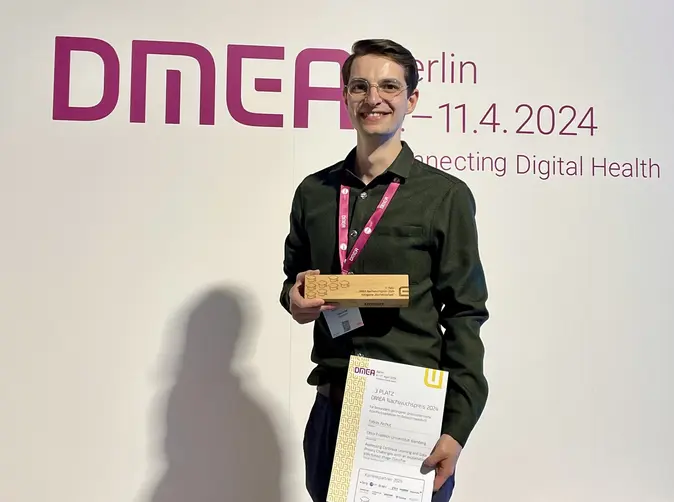Digital Healthcare Award for Bachelor Thesis in Berlin, April 10, 2024
In a celebration of burgeoning talent within the digital healthcare sphere, Tobias Archut, one of xAI Lab’s promising students, clinched third place at the esteemed DMEA Newcomer Award. Hosted annually by DMEA – Europe's leading event for digital health - this accolade aims to recognize outstanding bachelor and master theses showcasing innovative ideas and transformative solutions to propel healthcare digitalization forward.
Tobias’ outstanding achievement stems from his insightful thesis titled "Addressing Continual Learning and Data Privacy Challenges with an Explainable kNN-based Image Classifier". His work epitomizes the growing necessity for interpretable, data-efficient, and privacy-conscious classification systems crucial for supporting medical workflows and clinical diagnosis. Present automatic classification systems often lack transparency and adaptability to data variations, presenting obstacles in addressing data privacy concerns.
Sharing the spotlight with Tobias in the Bachelor’s Thesis category were Simon Koller (#1 place) from the Bern University of Applied Sciences, with his work on "Analyzing Signal Data in Neurosurgery using Time Series Methods, and Pia Lehmann (#2 place) from the Max Planck Institute for Evolutionary Anthropology, whose thesis focused on "Development of a Web Application for Diagnosing Rare Diseases for Physicians using Information Retrieval from Open Medical Databases".
In the Master’s Thesis category, Julian Hugo (#1 place) from the Hasso Plattner Institute at the University of Potsdam emerged as the winner with his work on "Predicting Initial Diagnoses of Crohn’s Disease using Machine Learning". Pauline Nöldemann (#2 place) from the Friedrich-Alexander-Universität Erlangen-Nürnberg also made a significant contribution with her thesis on "Identifying Food Intolerances using Artificial Intelligence - a Data-driven Approach", while Jennifer Miller (#3 place) of the MOLIT Institute secured the third spot with her thesis focusing on "Design and Prototype Implementation of a Decision Support System for Therapy Recommendations in Virtual Molecular Tumor Boards".
The DMEA serves as a pivotal platform for industry leaders, healthcare professionals, and policymakers to converge and exchange groundbreaking ideas. With over 18,600 participants, around 800 exhibitors, and more than 350 speakers from Germany and abroad in attendance, the event continues to foster innovation and collaboration in the dynamic realm of digital healthcare.
As Tobias and his peers revel in the glory of their achievements, their success underscores the indispensable role of young visionaries in advancing the digital transformation of healthcare.
For a more in-depth look at Tobias’ innovative work, viewers are invited to explore the following presentation on YouTube. In addition, his thesis has laid the groundwork for a comprehensive research contribution, titled “Integrating kNN with Foundation Models for Adaptable and Privacy-Aware Image Classification” that has been accepted for presentation at IEEE ISBI 2024. To delve into this research further, we encourage you to access the preprint of the paper here (https://arxiv.org/abs/2402.12500) and explore the associated code here.
For further information about the DMEA Newcomer Award and its esteemed winners, please visit the official blog and if you are interested to gain further insights into all finalist projects, consider watching their respective pitches on YouTube.

